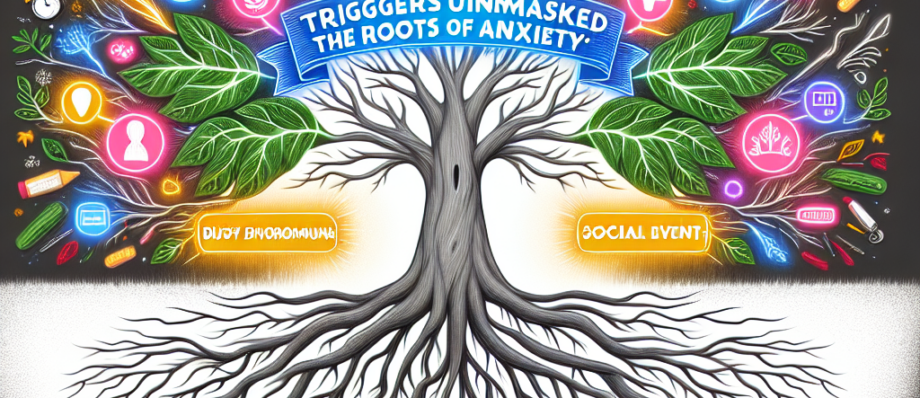Understanding What Causes Anxiety and How to Navigate It
Feeling anxious is something many of us can relate to. Whether it’s the flutter of nerves before an important presentation or an overwhelming sense of dread about the future, anxiety has a way of creeping into our lives when we least expect it. But what exactly causes this feeling that can be so debilitating at times? Let’s unravel the mysteries of anxiety together.
The Science Behind Anxiety
Anxiety isn’t just a buzzword; it’s a complex emotional experience rooted deeply in our biology and environment. Psychological experts have identified several factors that contribute to anxiety, such as:
-
Genetics: If anxiety runs in your family, your chances of experiencing it yourself may be higher. Our brains are wired in certain ways, and those wiring patterns can often be passed down.
-
Brain Chemistry: Neurotransmitters, the brain’s chemical messengers, play a significant role in driving our anxiety levels. Imbalances in these chemicals can lead to heightened feelings of anxiety and worry.
-
Environmental Triggers: Stressful life events, such as the loss of a loved one, divorce, or even job loss, can trigger anxiety. Our surroundings—whether they’re chaotic or toxic—can also contribute significantly to how we feel.
- Cognitive Patterns: The way we think about the world can massively impact our mental health. If you often find yourself in negative thought spirals, it can amplify feelings of anxiety.
Personal Perspectives on Anxiety
Let me share a story. During my first year of college, I faced my toughest battles with anxiety. The pressure to perform, coupled with the fear of not living up to my own expectations, spiraled me into a phase of persistent worry. It was like carrying an invisible backpack filled with heavy rocks. One day, amidst finals week chaos, I broke down and reached out for help.
That moment was a turning point, leading me to explore various coping mechanisms, including mindfulness and therapy. What I learned is that anxiety often feels isolating, but you’re definitely not alone in this struggle.
Unpacking Triggers and Understanding Responses
Recognizing what triggers your anxiety is essential in managing it effectively. Here are a few common triggers:
-
Work Pressure: Tight deadlines can create immense pressure, amplifying feelings of worry.
-
Social Situations: Interacting in large groups or even small gatherings can cause unease for many.
-
Health Concerns: Worrying about your health or the health of loved ones can easily lead to anxious thoughts.
- Financial Worries: Money can be a significant source of stress, especially during unpredictable times.
Confronting these triggers while exploring understanding and coping strategies can transform how anxiety affects your daily life.
The Benefits of Reaching Out for Help
If you’re feeling overwhelmed, it’s crucial to know that help is available. Online therapy is one increasingly popular avenue for those grappling with anxiety. Here are some of the benefits:
-
Accessibility: Online therapy provides you with immediate access to trained professionals from the comfort of your own home.
-
Flexibility: You can schedule sessions that fit into your busy life, making mental health care more feasible.
-
Confidentiality: Talking to a professional in a secure environment can help you express your thoughts freely.
- Diverse Approaches: Online therapy platforms often offer a variety of therapists with different styles, allowing you to find one that resonates with you.
If you’re ready to take a step towards feeling better, consider checking out online therapy options at this link. It might just be the support you need to navigate the waters of anxiety.
Embracing Tools and Techniques
While reaching out for professional help is vital, having your own toolkit can effectively ease the burden of anxiety. Here are a few self-empowering techniques:
-
Mindfulness and Meditation: Practicing mindfulness can significantly reduce anxiety levels. Just a few minutes a day can help ground your thoughts.
-
Regular Exercise: Physical activity releases endorphins, which are known as “happiness hormones,” and can combat feelings of anxiety.
-
Writing It Down: Journaling your thoughts and feelings can be a powerful tool for processing your emotions.
-
Deep Breathing Exercises: These can help bring your attention back to the present moment and calm your mind during panic.
- Social Support: Never underestimate the power of talking things out with friends or family members who understand.
Realizing You’re Not Alone
One of the most comforting realizations is that anxiety is a common human experience. The pressure to appear perfect in an imperfect world can be immense. Remember, no one always has it together. Whether through shared stories, support groups, or professional help, sometimes it just takes one conversation to lighten that load.
Journeying Forward with Hope
While anxiety can feel like an uphill battle, it’s essential to focus on the steps we’re able to take rather than the overwhelming weight of it all. Each small act of self-care or seeking support can pave the way to more manageable days.
If you ever find yourself lost in a haze of anxiety, remember there’s always a way forward. With the right tools, support, and a sprinkle of self-love, brighter days await you.
Feeling anxious is a part of being human, but it doesn’t have to define you. Embrace the journey of understanding and healing, knowing that there’s always a light at the end of the tunnel.
Disclosure:
Hospitals.net is a participant in the Amazon Services LLC Associates Program, an affiliate advertising program designed to provide a means for sites to earn advertising fees by advertising and linking to Amazon.com, .ca, .co.uk, etc.
AI Disclaimer:
Hospitals.net uses artificial intelligence (AI) tools to assist in gathering and summarizing product information, including reviews and other relevant data for Amazon products and services. While we strive to ensure the accuracy of the information provided, AI-generated content may not always reflect the most up-to-date or accurate details. The information on our site should not be considered professional advice, and users are encouraged to verify any product details directly with Amazon or other official sources before making a purchase.
We do not guarantee the completeness or accuracy of the AI-generated content and are not liable for any discrepancies or errors. Any reliance on the information provided is at the user’s own risk. By using this site, you acknowledge that product availability, pricing, and other details may change over time, and Hospitals.net is not responsible for these changes.
Health Disclaimer:
The health products and information provided on Hospitals.net are for informational purposes only and are not intended to substitute professional medical advice, diagnosis, or treatment. Always consult a qualified healthcare provider or medical professional before using any health products or following any advice you find on this site. The content on Hospitals.net, including product recommendations and reviews, is not a substitute for individualized care from a healthcare provider.
We make no warranties or representations regarding the effectiveness, quality, or safety of the products listed on our site. Any use of these products is solely at your own risk. Hospitals.net is not liable for any harm, injury, or adverse effects that may result from the use or misuse of the health products or information provided.
Please read all product labels, warnings, and directions provided by the manufacturer before using any product. If you have any questions about a product or its suitability for your condition, we recommend contacting the manufacturer directly or consulting a healthcare professional.
If you have any concerns regarding the accuracy of the information on this site, please contact us for further clarification.



